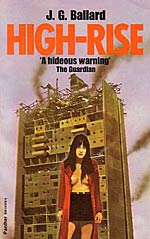
![]() charlesdee
charlesdee
8/4/2011
![]()
Imagine the bloated bestseller that could be made from the material in this book. We would be introduced to characters as they moved into their apartments, background sketches of each provided, then the first hints that something was beginning to go wrong would appear, graphic sexual and violent acts would be described in detail, and 458 pages with wide margins later, things would come to an end.
This is how Ballard opens his novel:
Later, as he sat on the balcony eating the dog, Robert Laing reflected on the unusual events that had taken place within this huge apartment building during the last three months.
And it takes Ballard just 174 pages to give the reader a funhouse ride that is alternately hilarious, unnerving, disgusting, and I am tempted to say "moving," but I don't know that Ballard would approve. Balard's thesis is that the very architecture of the building produces psychosis among the upscale, new cliff dwellers. Alcohol and adultry can only keep them distracted up to a point, then it's escalating acts of violence possibly including cannibalism. Ballard's main characters, however, each admits to himself at one point that he finds this slide into psychosis liberating, and that they are, in fact, having the time of their lives.
I admired this book as much as I have any Ballard novel, but I found it very hard going. Although I wouldn't want the bloated bestseller I fantasized above, High Rise could do with a bit more forward momentum. As each chapter adds another level of madness to the account, the book I was reminded of was de Sade's 120 Days of Sodom. Unlike Ballard, I found Sade genuinely unreadable, but I remember that book as just a constant piling on of horrors, ending finally in northing more than notes, as though the Marquis had been overtaken by his material.
Ballard of course keeps himself together from beginning to end. The book is icily brilliant. Even writing this I find I like it more in retrospect than I did while reading it.
http://www.potatoweather.blogspot.com